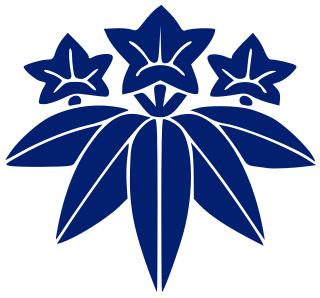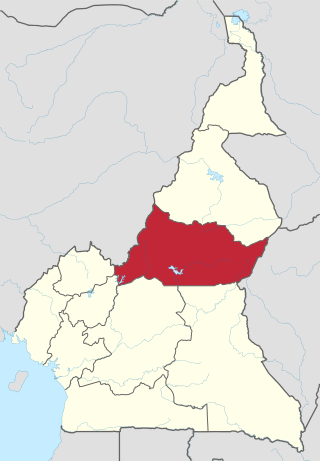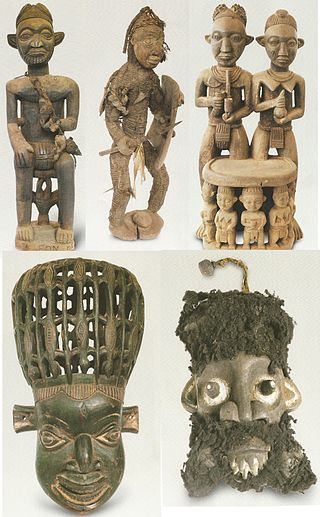
Minamoto (源) was a noble surname bestowed by the Emperors of Japan upon members of the imperial family who were excluded from the line of succession and demoted into the ranks of the nobility since 814. The Minamoto was the most powerful and most important clan of all four great clans that dominated Japanese politics during the Heian, Kamakura, Muromachi and Edo periods in Japanese history—the other three were the Fujiwara, the Taira, and the Tachibana.

A Fon is a chieftain or king of a region of Cameroon, especially among the Ngie, Widikum, Tikar, and Bamiléké peoples of the Bamenda grass fields and the Lebialem of the South West Region. Following the defeat of Germany in World War I, the Fons of British Cameroon came under British rule, and the Fons of French Cameroon came under French rule. Since Cameroon's independence in 1961, the Fons are under the jurisdiction of the Government of Cameroon. However, they maintain semi-autonomous union councils and jurisdiction over their hereditary land.

The Tikar are a Central African people who inhabit the Adamawa Region and Northwest Region of Cameroon. They are known as great artists, artisans and storytellers. Once a nomadic people, some oral traditions trace the origin of the Tikar people to Northern Nigeria, the Sudanian savanna, or the Sudan. Such ethnic groups were referred to in the 1969 official statistics as "Semi-Bantus" and "Sudanese Negroes." They speak a Northern Bantoid language called Tikar. One of the few African ethnic groups to practice a monotheistic traditional religion, the Tikar refer to God the Creator by the name Nyuy.They also have an extensive spiritual system of ancestral reverence.

Cameroon is home to at least 250 languages, with some accounts reporting around 600. These include 55 Afro-Asiatic languages, two Nilo-Saharan languages, four Ubangian languages, and 169 Niger–Congo languages. This latter group comprises one Senegambian language (Fulfulde), 28 Adamawa languages, and 142 Benue–Congo languages . French and English are official languages, a heritage of Cameroon's colonial past as a colony of both France and the United Kingdom from 1916 to 1961. Eight out of the ten regions of Cameroon are primarily francophone, representing 83% of the country's population, and two are anglophone, representing 17%. The official percentage of French and English speakers by the Presidency of Cameroon is estimated to be 70% and 30% respectively.

The Musgum or Mulwi are a Chadic ethnic group in Cameroon and Chad. They speak Musgu, a Chadic language, which had 61,500 speakers in Cameroon in 1982 and 24,408 speakers in Chad in 1993. The Musgum call themselves Mulwi.
Jeyran Mangeh is a village in Zarrineh Rural District, Karaftu District, Divandarreh County, Kurdistan Province, Iran. At the 2006 census, its population was 332, in 61 families. The village is populated by Kurds.
Peter Wuteh Vakunta is an author, literary theorist, poet, and professor, noted for his work in and on hybrid languages, including Camfranglais, Cameroonian Creole, linguistic indigenization, and multilingual educational systems. He is originally from Bamunka-Ndop, in the Northwest Region of the Republic of Cameroon, and currently teaches French language and literature and serves as Chair of the Department of Modern Languages at the University of Indianapolis.
Bamunkumbit is one of the thirteen villages that make up Ngo-Ketunjia Division of the North West Region, Cameroon. Officially called Bamunkumbit, it is also referred to by the indigenes as Mankong.
Bamunka is a small village of Cameroon located in the North West Region along the ring road from Bamenda. Bamunka Village is the Sub Divisional Headquarter of Ndop Central Subdivision and the Divisional Headquarter of Ngoketunjia Division.

Bambalang is a village located in the NorthWest Region of Cameroon. The village of Bambalang is one of the four villages that make up Ndop Central Sub Division and one of the thirteen villages that make up Ngoketunjia Division. Bambalang village saw most of its fertile land flooded upon the completion of the Bamendjin Dam in 1974 giving rise to some Islands like Mbissa, Nkeshie, Mbefekhu, Mishie and Mpayah. The Bamendjin Dam was constructed mainly to serve as a reservoir to feed the hydroelectric plant at Edéa. It was constructed across the Noun River, a tributary of the Sanaga River that operates the hydroelectric plant at Edea. The construction of this dam has served as a source of mixed feelings for Bambalang people because while those whose fertile land were flooded look at it as a mishap, it is beneficial to a cross section of the population given that it is contributing enormously to the economy of the village with thousands of fishermen whose lives and that of their families depend on fish gotten from the water. The vegetation is Guinea Savanna as farming has destroyed most forests with the exception of the "Pa’ah Ngwong" Forest at the heart of the village. Bambalang village is mainly a hillock stretching in a North West, South-East direction. It is narrow at the North-West and broadens towards the South East, appearing as a semi-Island or a promontory. Bambalang has a length of about 21 km and a width of about 8 km giving an area of about 168 km2 supporting a population of 20.863 people.

Babungo is one of the four villages of Babessi Sub Division, Ngoketunjia Division of the North West Region Cameroon. It is situated on the Ring Road from Bamenda about ten kilometers from Bamunka on the high plain of Ndop which is fertile and rich in water, intensely cultivated and surrounded by a ring of hills covered with pastures, making it an ideal grazing land.

Balikumbat is a village located in Balikumbat Sub Division, Ngoketunjia Division of the North West Region, Cameroon. Balikumbat is the Sub Divisional Headquarter of Balikumbat Sub Division and located about 20.9 km from Ndop town.
Bamali village is one of the four villages that make up Ndop Central sub division and one of the thirteen villages of Ngoketunjia division of the North West region of Cameroon. Bamali village is located partly along the ring road from Bamenda some 40 km away from Bamenda town on the Bamenda-Nkambe stretch of the ring road just before reaching Bamunka.
Baba I village (Papiakum) is one of the four villages that make up Babessi subdivision and one of the thirteen villages of Ngoketunjia division of the North West region of Cameroon. Baba I village is located along the ring road from Bamenda some 58 km away from Bamenda town on the Bamenda-Nkambe stretch of the ring road just before one reaches Babessi town.

DikoMadeleine was the first wife of Chief Konaka of Somié and with him was one of the major actors negotiating the transition to Colonial rule and the introduction of Christianity among Mambila people in Cameroon.
This is a timeline of the Anglophone Crisis during 2020.
This is a timeline of the Anglophone Crisis during 2021.
This is a timeline of the Anglophone Crisis in Cameroon during 2022.
Clement Mbashie, better known by his nom de guerre "General No Pity", is an Ambazonian separatist who commands several militant groups, most importantly the Bambalang Marine Forces and Bui Unity Warriors, in the Anglophone Crisis.
This is a timeline of the Anglophone Crisis in Cameroon during 2023.









